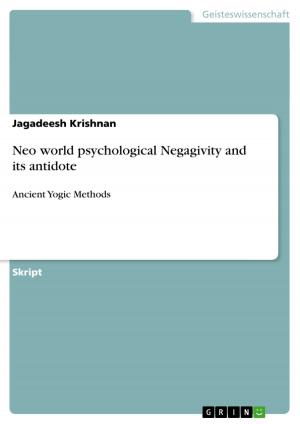Conflict and the black servant in Oyono's 'Houseboy' and Gordimer's 'July's People'
Fiction & Literature, Literary Theory & Criticism| Author: | Wazha Lopang | ISBN: | 9783668098916 |
| Publisher: | GRIN Verlag | Publication: | December 1, 2015 |
| Imprint: | GRIN Verlag | Language: | English |
| Author: | Wazha Lopang |
| ISBN: | 9783668098916 |
| Publisher: | GRIN Verlag |
| Publication: | December 1, 2015 |
| Imprint: | GRIN Verlag |
| Language: | English |
Scientific Essay from the year 2015 in the subject Literature - Africa, University of Botswana, language: English, abstract: This study intends to compare the portrayal of conflict in Ferdinand Oyono's 'Houseboy' and Nadine Gordimer's 'July's People'. Specifically, it looks at how the black servant is forced to balance the loyalty he has for the white employer and for his African roots. The analysis of 'Houseboy' will focus on how conflict is represented between whites and blacks, how it can satirically have a positive influence on others and lastly, how conflict among the blacks can be very destructive. 'Houseboy' shows how conflict can be prompted by stereotypes; how it can be a shield from other pressing concerns and even how conflict itself can provide an outlet for humour. The analysis of 'July's People' will on the other hand focus on how people can live together under pretences that they are at peace with one another when in actual fact they are not; how the black servant can be in conflict with people of other races or their traditions as well as how that servant can be in conflict with fate or destiny. In conclusion it will be shown how 'Houseboy' is more explicit in portraying conflict than 'July's People' due to the events that happened in the two texts. An argument can be made therefore if conflict experienced by black servants during the colonial period was more in the open as opposed to that of apartheid South Africa.
Wazha Lopang is a lecturer in the Department of English at the University of Botswana. His area of interest is oral literature and the gender politics within. He has written articles arguing that the African trickster is androgynous and not male as some storytellers and listeners believe. He is co-editor and contributor of AMANTLE! , a book that focuses on Botswana Literature. Currently he is working on how the dislocation of minorities affects rituals that involve species alien to their new environment.. He has published a short story for The Caine Prize Workshop (2013), The Strange Dance of The Calabash. He was the winner of the 2015 Poetavango short story competition for his story, The Small Matter of the Jelly. He was second runner up in the 2012 Bessie Head Competition. His novel, The Guardian of the Spirit Stone was published online by Just Fiction.
Scientific Essay from the year 2015 in the subject Literature - Africa, University of Botswana, language: English, abstract: This study intends to compare the portrayal of conflict in Ferdinand Oyono's 'Houseboy' and Nadine Gordimer's 'July's People'. Specifically, it looks at how the black servant is forced to balance the loyalty he has for the white employer and for his African roots. The analysis of 'Houseboy' will focus on how conflict is represented between whites and blacks, how it can satirically have a positive influence on others and lastly, how conflict among the blacks can be very destructive. 'Houseboy' shows how conflict can be prompted by stereotypes; how it can be a shield from other pressing concerns and even how conflict itself can provide an outlet for humour. The analysis of 'July's People' will on the other hand focus on how people can live together under pretences that they are at peace with one another when in actual fact they are not; how the black servant can be in conflict with people of other races or their traditions as well as how that servant can be in conflict with fate or destiny. In conclusion it will be shown how 'Houseboy' is more explicit in portraying conflict than 'July's People' due to the events that happened in the two texts. An argument can be made therefore if conflict experienced by black servants during the colonial period was more in the open as opposed to that of apartheid South Africa.
Wazha Lopang is a lecturer in the Department of English at the University of Botswana. His area of interest is oral literature and the gender politics within. He has written articles arguing that the African trickster is androgynous and not male as some storytellers and listeners believe. He is co-editor and contributor of AMANTLE! , a book that focuses on Botswana Literature. Currently he is working on how the dislocation of minorities affects rituals that involve species alien to their new environment.. He has published a short story for The Caine Prize Workshop (2013), The Strange Dance of The Calabash. He was the winner of the 2015 Poetavango short story competition for his story, The Small Matter of the Jelly. He was second runner up in the 2012 Bessie Head Competition. His novel, The Guardian of the Spirit Stone was published online by Just Fiction.















